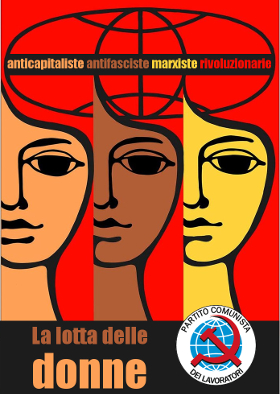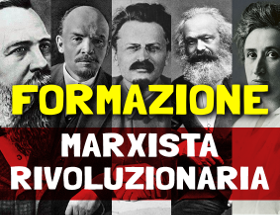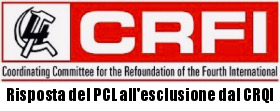Internazionale
European election results in Italy and Europe
For a change and an independent initiative of the workers movement
12 Giugno 2024
The vote for the new EU Parliament is the result of each country's electoral outcome, since the national political situation prevails as final motivation for the vote.
However, it is possible to point out some trend lines on the continental level.
The EPP (European People's Party) confirms and consolidates its centrality in the EU as the lynchpin of its political balances. It has established itself as the leading party in Germany, Spain, Poland, Greece, Slovenia and Ireland. Overall, it increased its seats in the European Parliament from 179 to 186.
The liberal camp (ALDE, Alliance of Liberals and Democrats for Europe) experienced a stark weakening, dragged down by the heavy defeat in France, Belgium and Spain. It drops from 106 to 79 seats.
The Green area suffers a strong retreat, due to defeats in Germany and France. It drops from 74 to 52 seats.
The PES (Party of European Socialists) shows an overall retreat at European level (from 153 to 137 seats), but with different results from country to country. It collapses to its lowest point in Germany, where it leads the government; it has a recovery in France, after the collapse following Hollande's presidency; it achieves the victory in other countries, such as the Netherlands, Sweden and Portugal, while in Italy it strengthens by the PD result.
The parties of the Party of the European Left, which have been suffering over the years by more or less profound processes of crisis or disarticulation, maintain its presence in the European Parliament (with 36 seats, losing one seat), but with very differentiated results and dynamics in the different countries. In Spain it suffers the heavy defeat of Sumar, not compensated by Podemos. In France, despite the crisis of NUPES, it retains a relatively consistent force (with Mélenchon's France Insoumise at 10% and the PCF at 2.3%). In Germany it suffered the split of Die Linke (which achieves between 2 and 3%) with the birth to its right of a sovereignist formation (BSW) which gains 5%.
The sovereignist right-wing strengthened both within the ECR (European Conservatives and Reformists), headed by Giorgia Meloni (who went from 64 to 73 seats), both in the ID (Identity and Democracy), dominated by Marine Le Pen (who went from 49 to 58 seats). Added to this is the result reported by the far-right AfD in Germany, which has recently moved away from ID (with 16%).
On the whole, right-wing forces increased their seats in the European Parliament. But this is neither an overwhelming nor a uniform advance. The result of the right-wing parties is in fact strongly differentiated from country to country. They fall, for example, in Poland (with a clear setback of PiS), in Hungary (where Orban's party loses eight percentage points), in Sweden, in Slovakia.
The main electoral expression of the strengthening of the right-wing forces is the strong affirmation in key EU imperialist countries such as France (with the Rassemblement National over 32%), Italy (with Fratelli d'Italia at 28.8%), Germany (with the strong growth of Alternative für Deutschland), which naturally has continental political relevance.
In France, Le Pen's success triggered a political-institutional crisis, with the dissolution of parliament and the scheduling of new elections.
In the crucial years of coronavirus pandemic, of war, of the growth of social inequalities, the absence of crucial fights of the workers movement, due to the responsibility of its trade union and political leaderships, has led to an overall strengthening of the bourgeois political camp, and in particular of reactionary sovereignism.
The sovereignist right-wingers, even though with different dynamics and contradictions, capitalised on the joint crisis of bourgeoisie and the workers movement, aiming at a reactionary petty-bourgeois hegemony over large swathes of the urban and rural poors, and over relevant sectors of the industrial working class itself.
POLARIZATION IN ITALY
The election results in Italy are within this European framework, with its own national features.
Voter turnout fell sharply compared to the previous general election in 2022, falling from 64% to 49%, in contrast to the opposite trend in other countries (Germany).
Electoral polarisation is the most obvious profile of the Italian outcome.
The post-fascist-led government consolidated from the electoral test. Fratelli d'Italia strengthens its vote percentage from the already extraordinary figure of the 25 September 2022 general election (26%) to 28.8%. Forza Italia survives the death of Berlusconi by consolidating its results (from 8.1% in the political elections to 9.6%), amid the fragmentation and dispersion of the centrist pole (Calenda, Renzi and Bonino). Salvini's League substantially retains the results of the general elections (rising from 8.8% to 9.07%) with the help of Vannacci candidature, albeit with a weakening in northern regions.
On the whole, the government majority rises from 44% in the general election to 48% in the European elections (although falling back in numerical score, to a greater or lesser extent). After two years of Meloni government, this is a fact of undoubted political meaning. Unlike France and Germany, Italy is experiencing relative stability of its national government.
The liberal bourgeois PD capitalises on the polarisation with the government, and with Giorgia Meloni in particular. It is also the result of the new turn followed by the secretary (Elly Schlein), which is more responsive to civil rights and social issues. PD thus went from 19% in the 2022 general election to 24.1%, with the increase of one million absolute votes and the achievement of the victory in the Southern regions.
It is an important result, all the more so because of the heavy electoral defeat of the M5S, which went from 15.6% in the political elections to 10%, losing two million votes, mainly in direction of abstention, but also of the PD itself and AVS (Green and Left Alliance).
The reformist AVS (Green and Left Alliance) reached 6.7%, with more than one and a half million votes. This result is all the more relevant because it was achieved in the presence of a strong recovery of the PD.
The candidature of Ilaria Salis - whom we supported - greatly contributed to the result.
The vote for AVS includes demand for representation to the left of the PD, a demand which is in contradiction with the consistent and irreversible choise of coalition with the PD that AVS's leadership pursues.
WHY MELONI STRENGTHENS.
THE NEED FOR A CHANGE
The strengthening of the reactionary post-fascist-led camp after two years of government is the measure of the crisis of the Italian workers movement and the responsibilities of its leaderships.
Two years of substantial social peace have given the Meloni government a huge room for manoeuvre. The government has been able to suppress the basic income for unemployed, widen job insecurity, deregulate contracts, cut social benefits in health and education, increase military spending, agree on a ‘new’ Stability and Growth Pact in Europe based on other social cuts, promote military missions abroad... all this without any real and serious mass mobilisation of the working class.
Break social peace, promote a unifying fight platform, open a general struggle against government and bosses is even more a political necessity today.
The important demand for opposition to the Meloni government that has gathered around AVS and Schlein's turn must be transformed to real mobilization. It is the only way to open up the contradictions of the bourgeois social bloc, freeing millions of workers from the reactionary hegemony of the right-wing. Thi is thee only way to get the ball rolling in the Italian political scene.
The class and democratic struggle is inseparable from the open fight against imperialism and Zionism. This means first of all open support for the Palestinian people, for their resistance against Zionist oppression, for the elementary principle of their self-determination, against any form of conciliation with a colonial State.
Meloni government relies on the bipartisan support in foreign policy granted by the PD (and the PES in Europe), revealed by the shameful vote in Parliament with wich right-wing, PD and M5S supported the Italian military mission in the Red Sea against the Houthis and the Palestinian resistance, and confirmed by the PD's dissociation from the struggles of the solidarity movement with the Palestinian people which are taking place in the Italian universities as in many universities around the world.
The need of the workers movement is exactly the opposite -- against all form of imperialist militarism, against NATO, against Zionism, in defense of every oppressed people. Today it requires a mass strike action, involving all class unions, in support of the people of Palestine, outside any logic of pacifist equidistance and de facto subordination to Zionism.
But this general turn implies the complete independence of the workers movement from the bourgeois PD and from the subordination to the centre-left coalitions. It implies the building of an independent political representation of the working class on the basis of an anti-capitalist program, fighting for a workers government -- the only real alternative to the capitalist status quo, in Italy and in Europe.
The PCL is committed to building such a party, by linking unity in the struggle, against every form of sectarianism, and radical program, against every illusion in reformism.










